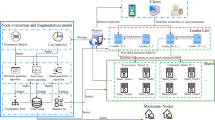Abstract
According to different application scenarios of blockchain system, it is generally divided into public chain, private chain and consortium chain. Consortium chain is a typical multi-center blockchain, because it has better landing, it is supported by more and more enterprises and governments. This paper analyzes the advantages and problems of Practical Byzantine Fault Tolerance (PBFT) algorithm for the application scenarios of the consortium chain. In order to be more suitable for consortium chains, this paper proposes a new optimized consensus algorithm based on PBFT. Aiming at the shortcomings of PBFT, such as the inability to dynamically join nodes, low multi-node consensus efficiency, and primary master node selection, our optimized algorithm has designed a hierarchical structure to increase scalability and improve consensus efficiency. The simulation results show that compared with PBFT and RAFT, our new consensus algorithm increases the data throughput while supporting more nodes, and effectively reducing the consensus delay and the number of communication times between nodes.














Similar content being viewed by others
References
Nakamoto S (2008) Bitcoin: A peer-to-peer electronic cash system
Peck ME (2017) Blockchain world-Do you need a blockchain? This chart will tell you if the technology can solve your problem. IEEE Spectrum 54(10):38–60
Zheng Z, Xie S, Dai H, Chen X, Wang H (2017) An overview of blockchain technology: Architecture, consensus, and future trends. In: 2017 IEEE international congress on big data (BigData congress). IEEE, pp 557–564
Yang S, Deng B, Wang J, Li H, Lu M, Che Y, Wei X, Loparo KA (2019) Scalable digital neuromorphic architecture for large-scale biophysically meaningful neural network with multi-compartment neurons. IEEE Trans Neural Netw Learn Sys 31(1):148–162
Yang S, Wang J, Deng B, Liu C, Li H, Fietkiewicz C, Loparo KA (2018) Real-time neuromorphic system for large-scale conductance-based spiking neural networks. IEEE Trans Cybern 49(7):2490–2503
Morabito V (2017) Business innovation through blockchain. Springer International Publishing, Cham
Buterin V (2014) A next-generation smart contract and decentralized application platform. White Paper 3(37)
Crosby M, Pattanayak P, Verma S, Kalyanaraman V (2016) Blockchain technology: Beyond bitcoin. Applied Innovation 2(6-10):71
Mohan C (2019) State of public and private blockchains: Myths and reality. In: Proceedings of the 2019 international conference on management of data, pp 404–411
Guo Y, Liang C (2016) Blockchain application and outlook in the banking industry. Financial Innovation 2(1):24
Gramoli V (2020) From blockchain consensus back to byzantine consensus. Future Gener Comput Syst 107:760–769
Xiao Y, Zhang N, Lou W, Hou YT (2020) A survey of distributed consensus protocols for blockchain networks. IEEE Commun Surv Tutor 22(2):1432–1465
Pahlajani S, Kshirsagar A, Pachghare V (2019) Survey on private blockchain consensus algorithms. In: 2019 1st International conference on innovations in information and communication technology (ICIICT). IEEE, pp 1–6
Jakobsson M, Juels A (1999) Proofs of work and bread pudding protocols. In: Secure information networks. Springer, Boston, pp 258–272
King S, Nadal S (2012) Ppcoin: Peer-to-peer crypto-currency with proof-of-stake. Self-published paper, August, 19, 1
Larimer D (2017) Delegated proof-of-stake consensus. bitshares.org. https://bitshares.org/technology/delegating-proof-of-stake-consensushttps://bitshares.org/technology/delegating-proof-of-stake-consensus. Accessed March 28th, 2017
Sankar LS, Sindhu M, Sethumadhavan M (2017) Survey of consensus protocols on blockchain applications. In: 2017 4th international conference on advanced computing and communication systems (ICACCS). IEEE, pp 1–5
Mingxiao D, Xiaofeng M, Zhe Z, Xiangwei W, Qijun C (2017) A review on consensus algorithm of blockchain. In: 2017 IEEE International Conference on Systems, Man, and Cybernetics (SMC). IEEE, pp 2567–2572
Huang D, Ma X, Zhang S (2019) Performance analysis of the raft consensus algorithm for private blockchains. IEEE Trans Sys Man Cybern Sys 50(1):172–181
Castro M, Liskov B (2002) Practical Byzantine fault tolerance and proactive recovery. ACM Trans Comput Sys (TOCS) 20(4):398–461
Khosravi A, Kavian YS (2016) Broadcast gossip ratio consensus: Asynchronous distributed averaging in strongly connected networks. IEEE Trans Signal Process 65(1):119–129
Sukhwani H, Martínez JM, Chang X, Trivedi KS, Rindos A (2017) Performance modeling of PBFT consensus process for permissioned blockchain network (hyperledger fabric). In: 2017 IEEE 36th Symposium on Reliable Distributed Systems (SRDS). IEEE, pp 253–255
Zhang L, Li Q (2018) Research on consensus efficiency based on practical byzantine fault tolerance. In: 2018 10th International conference on modelling, identification and control (ICMIC). IEEE, pp 1–6
Wang S (2019) Performance evaluation of hyperledger fabric with malicious behavior. In: International conference on blockchain. Springer, Cham, pp 211–219
Wang X, WeiLi J, Chai J (2018) The research on the incentive method of consortium blockchain based on practical byzantine fault tolerant. In: 2018 11th international symposium on computational intelligence and design (ISCID), vol 2. IEEE, pp 154–156
He L, Hou Z (2019) An improvement of consensus fault tolerant algorithm applied to alliance chain. In: 2019 IEEE 9th international conference on electronics information and emergency communication (ICEIEC). IEEE, pp 1–4
Wang H, Guo K (2019) Byzantine fault tolerant algorithm based on vote. In: 2019 international conference on cyber-enabled distributed computing and knowledge discovery (CyberC). IEEE, pp 190–196
Zhu S, Zhang Z, Chen L, Chen H, Wang Y (2020) A PBFT consensus scheme with reputation value voting based on dynamic clustering. In: International conference on security and privacy in digital economy. Springer, Singapore, pp 336–354
Miller A, Xia Y, Croman K, Shi E, Song D (2016) The honey badger of BFT protocols. In: Proceedings of the 2016 ACM SIGSAC conference on computer and communications security, pp 31–42
Gueta GG, Abraham I, Grossman S, Malkhi D, Pinkas B, Reiter M, Seredinschi D, Tamir O, Tomescu A (2018) Sbft: a scalable decentralized trust infrastructure for blockchains (1804)
Li Y, Wang Z, Fan J, Zheng Y, Luo Y, Deng C, Ding J (2019) An extensible consensus algorithm based on PBFT. In: 2019 international conference on cyber-enabled distributed computing and knowledge discovery (CyberC). IEEE, pp 17–23
Zhang J, Rong Y, Cao J, Rong C, Bian J, Wu W (2019) DBFT: A byzantine fault tolerant protocol with graceful performance degradation. In: 2019 38th symposium on reliable distributed systems (SRDS). IEEE, pp 123–12309
Jalalzai MM, Busch C (2018) Window based BFT blockchain consensus. In: 2018 IEEE international conference on Internet of Things (iThings) and IEEE green computing and communications (GreenCom) and IEEE Cyber, physical and social computing (CPSCom) and IEEE Smart Data (SmartData). IEEE, pp 971–979
Gao S, Yu T, Zhu J, Cai W (2019) T-PBFT: An EigenTrust-based practical Byzantine fault tolerance consensus algorithm. China Commun 16(12):111–123
Lao L, Dai X, Xiao B, Guo S (2020) G-PBFT: a location-based and scalable consensus protocol for IOT-Blockchain applications. In: 2020 IEEE International parallel and distributed processing symposium (IPDPS). IEEE, pp 664–673
Okusanya O (2019) Consensus in Distributed Systems: RAFT vs CRDTs. https://repository.stcloudstate.edu/csitetds/29
Funding
This work was supported in part by the National Natural Science Foundation of China (NSFC) under Grant No. 61902203, Key Research and Development Plan - Major Scientific and Technological Innovation Projects of ShanDong Province (2019JZZY020101).
Author information
Authors and Affiliations
Contributions
Prof. Zhihan Lv conceived the work and suggested the outline of the paper. Mr.Yuxi Li and Mr. Liang Qiao carried out investigations and wrote the paper.
Corresponding author
Ethics declarations
Competing interests
The authors declare no competing interests.
Additional information
Publisher’s note
Springer Nature remains neutral with regard to jurisdictional claims in published maps and institutional affiliations.
Yuxi Li and Liang Qiao contributes equally to this work, both are the first authors.
This article is part of the Topical Collection: Special Issue on Blockchain for Peer-to-Peer Computing
Guest Editors: Keping Yu, Chunming Rong, Yang Cao, and Wenjuan Li
Rights and permissions
About this article
Cite this article
Li, Y., Qiao, L. & Lv, Z. An Optimized Byzantine Fault Tolerance Algorithm for Consortium Blockchain. Peer-to-Peer Netw. Appl. 14, 2826–2839 (2021). https://doi.org/10.1007/s12083-021-01103-8
Received:
Accepted:
Published:
Issue Date:
DOI: https://doi.org/10.1007/s12083-021-01103-8




